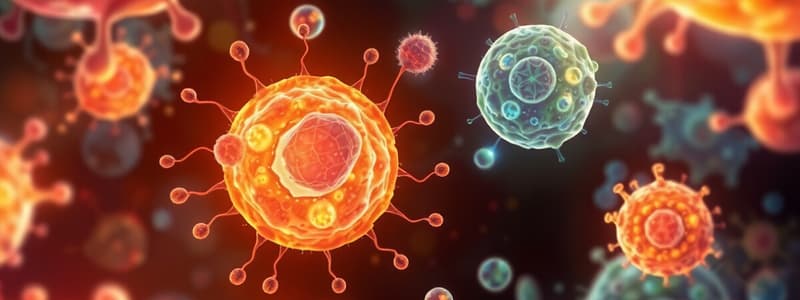Podcast
Questions and Answers
Which characteristic of living organisms is directly related to maintaining a stable internal environment?
Which characteristic of living organisms is directly related to maintaining a stable internal environment?
- Homeostasis (correct)
- Metabolism
- Adaptation
- Reproduction
What is the primary focus of the study of Microbiology?
What is the primary focus of the study of Microbiology?
- The behavior of animals
- The classification of plants
- The genetic variation in organisms
- Microorganisms like bacteria and viruses (correct)
What does a phylogenetic tree depict?
What does a phylogenetic tree depict?
- The population sizes of various species
- The nutritional needs of different organisms
- The evolutionary relationships among species (correct)
- The geographical distribution of species
Which biological molecules are primarily responsible for storing and transmitting genetic information?
Which biological molecules are primarily responsible for storing and transmitting genetic information?
Which concept is primarily focused on the flow of energy and nutrient cycles within ecosystems?
Which concept is primarily focused on the flow of energy and nutrient cycles within ecosystems?
What distinguishes prokaryotic cells from eukaryotic cells?
What distinguishes prokaryotic cells from eukaryotic cells?
Which process is NOT part of genetic inheritance models?
Which process is NOT part of genetic inheritance models?
Which of the following principles states that all living organisms are composed of cells?
Which of the following principles states that all living organisms are composed of cells?
Which factor contributes directly to population changes through mechanisms like genetic drift and mutation?
Which factor contributes directly to population changes through mechanisms like genetic drift and mutation?
What is a foundational principle that underlies biological investigation?
What is a foundational principle that underlies biological investigation?
Flashcards
Phylogenetic tree
Phylogenetic tree
A diagram that shows evolutionary relationships among organisms.
Ecosystem study
Ecosystem study
The study of living things and their interactions with their environment.
Genetic Inheritance
Genetic Inheritance
How traits are passed down from parents to offspring.
Evolution of Species
Evolution of Species
Signup and view all the flashcards
Biological Diversity
Biological Diversity
Signup and view all the flashcards
Characteristics of Living Organisms
Characteristics of Living Organisms
Signup and view all the flashcards
Cell Theory
Cell Theory
Signup and view all the flashcards
Central Dogma
Central Dogma
Signup and view all the flashcards
Biological Molecules (4 Types)
Biological Molecules (4 Types)
Signup and view all the flashcards
Prokaryotic vs. Eukaryotic Cells
Prokaryotic vs. Eukaryotic Cells
Signup and view all the flashcards
Study Notes
General Biology Concepts
- Biology is the scientific study of life and living organisms, encompassing various levels of organization, from molecules to ecosystems.
- Key characteristics of living organisms include:
- Organization: Defined structure and internal order.
- Metabolism: Chemical reactions for energy processing and building/breaking down molecules.
- Growth and Development: Increasing size in a structured way.
- Response to Stimuli: Adaptability to external or internal changes.
- Adaptation: Evolution of inheritable traits in response to environmental pressures.
- Reproduction: Creation of new cells or individuals.
- Homeostasis: Maintaining a stable internal environment.
- Evolution: Change in heritable characteristics of biological populations over successive generations.
Fundamental Biological Principles
- Cell Theory: All living organisms are composed of cells, the basic structural and functional unit of life.
- Central Dogma of Molecular Biology: DNA is transcribed to RNA, which is translated to proteins that determine cell function.
- Laws of Thermodynamics: Govern energy flow.
- Genetic Code and Inheritance: Explain the heritability of traits and genetic variation
Branches of Biology
- Microbiology: Study of microorganisms like bacteria, viruses, fungi, and protists.
- Botany: Study of plants—their structure, function, life cycle, and diversity.
- Zoology: Study of animals—their behavior, evolution, and classification.
- Ecology: Study of interactions among organisms and their environment.
- Genetics: Study of genes, heredity, and variation.
- Molecular Biology: Study of biological processes at the molecular level.
- Physiology: Study of the functions of organisms and their parts.
- Evolutionary Biology: Study of the processes that have shaped the diversity of life.
Biological Molecules
- Four major classes of biological molecules:
- Carbohydrates: Provide energy and structural support.
- Lipids: Store energy, insulation, and form cell membranes.
- Proteins: Perform diverse functions, including catalyzing reactions (enzymes).
- Nucleic Acids: Store and transmit genetic information (DNA and RNA).
Cellular Biology
- Prokaryotic cells: Lack membrane-bound organelles, simpler structure.
- Eukaryotic cells: Possess membrane-bound organelles like nucleus, mitochondria, etc., more complex structure.
Organismal Biology
- Organisms are classified into different taxonomic groups:
- Domains (Bacteria, Archaea, Eukarya).
- Kingdoms (e.g., Plantae, Animalia).
- Evolutionary relationships are depicted on phylogenetic trees, which show ancestor-descendant relationships
Ecology
- Study of ecosystems, communities, and populations.
- Includes concepts such as: energy flow, nutrient cycles, and population dynamics.
Genetics
- Explains patterns of inheritance using models of transmission of traits.
- Focuses on processes such as replication, transcription, and translation.
Biological diversity
- Explains the origin of species and the diversity within species through evolution.
- Factors that influence change in populations are genetic drift, mutation, gene flow, and natural selection.
Other key biological concepts
- Evolution is central to understanding the unity and diversity of life.
- Scientific method is the foundation of biological investigation.
- Ethical considerations play a vital role in understanding and using biological knowledge.
Studying That Suits You
Use AI to generate personalized quizzes and flashcards to suit your learning preferences.




